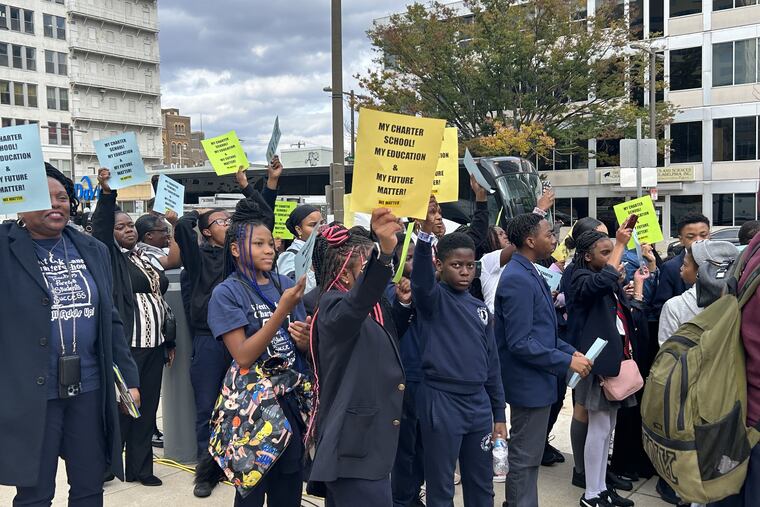Philly school board talks leveling, Black charter supporters make their case
Superintendent Tony B. Watlington Sr. also said he was ordering a comprehensive review of the district's leveling process, which moves teachers weeks into the school year.

The Philadelphia school board met Thursday night to borrow funds to ensure smooth cash flow, sell bonds to fix and build buildings, and more.
Supporters of some of the city’s Black-led charter schools also showed up in force before and during the meeting to call out the district over a recent report into bias against them in charter authorizing, supervision and closure, too.
Here are some key takeaways from the meeting:
Black-led charters and their supporters rally
About 100 students, faculty members and supporters of city charters gathered on the steps of the Philadelphia School District’s North Broad Street headquarters prior to the meeting, calling for fair treatment by the school board and district.
The rally follows the release of an investigatory report on whether the district and its charter office are biased against Black-led charters, as the African American Charter School Coalition has suggested for years. The report, released last week, found no overt racism, but flaws in the process and the district, as well as “unique challenges” for Black-led charters and inherent conflicts of interest between the school-system authorizer and its charter schools.
“We cannot continue to use a process we know is inequitable,” said Dawn Chavous, spokesperson for the coalition. “The framework used to evaluate charters is tainted.”
Children waved signs and grown-ups made impassioned speeches about fears for their children’s schools.
Marc Bredell, a parent from People for People Charter School said parents would continue to push hard against the district for changes to how they’re supervised, invoking Malcolm X.
“We’re at a stage now where it has to be ‘by any means necessary,’” Bredell said.
At another AACSC rally in Harrisburg Tuesday, Sen. Anthony Hardy Williams, a longtime charter and coalition supporter, went a step further, calling the school board “corrupt” and saying the district’s charter chief should be removed. He also encouraged coalition members meeting with legislators to throw chairs and “light them up.”
Williams did not appear at the Thursday preboard rally.
Big-bucks borrowing, bonds
The school board voted to sell $343 million worth of bonds to finance capital projects, and borrowed $399 million via tax and revenue anticipation notes. The district almost always has to engage in a temporary borrowing because of the uneven flow of revenue to the Philadelphia School District.
Nearly a quarter of the district’s funding — the school system’s budget is about $4 billion — comes from the city’s real estate collections, which don’t show up until March. But it’s got a steady stream of expenditures for things like payroll and charter school payments.
The actions come at a financial cost to the district — the price tag for the temporary borrowing is $13.4 million — but still keep the district under its goal of debt service being under 10% of total expenditures.
Though the district, alone in Pennsylvania as unable to control its own revenues, is looking at choppy financial waters beginning next year, it’s well-regarded by investors.
More on leveling
Superintendent Tony B. Watlington Sr. gave a rundown of the district’s leveling process, which shifts teachers weeks into the school year based on actual student enrollment.
This year, 59 of 217 district schools lost teachers or teacher positions, and 50 schools gained teachers.
“But we know that the impact of this is still pretty traumatic for children,” Watlington said.
Parents and children at multiple schools rallied against leveling, saying it was disruptive and counterproductive to academic progress. In past years, the district has said it cannot afford not to level, though most other districts do not use the process. This year, however, leveling was about a nationwide teacher shortage — even if the school system found the cash to hire extra teachers to cover oversized classes, rather than pull them from under-enrolled schools, it already has hundreds of unfilled teacher vacancies.
The superintendent said he was ordering a deep dive into the leveling process, and will report back publicly in the spring. City Council has also said it will hold hearings on the practice.